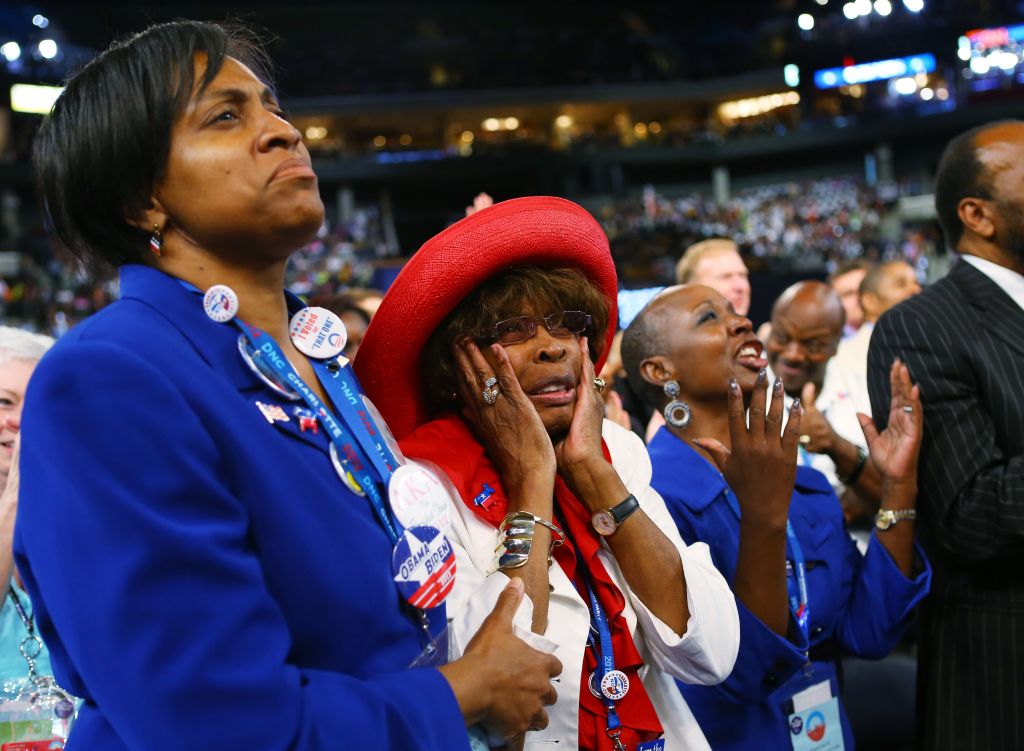-
 play_arrow
play_arrow
Foxy 106.9
-
 play_arrow
play_arrow
Dr. Candace Carter-Oliver Interview
Black Women And Kamala Harris: A Conversation With Strategist Aimee Allison

Source: Joe Raedle / Getty
In a world rife with systemic exclusion and a relentless struggle for justice, Aimee Allison is dedicated to creating inclusive and equitable spaces for Black women across the U.S.
As she nears her 55th birthday—solidly placing her in Generation X—Allison is more energized than ever to champion social justice, striving for a future where Black women are not only heard and seen but empowered to thrive. This election season is particularly personal for her–as it is for all Black women.
There are crucial issues at stake for Black women, from maternal morbidity to police and white supremacist violence, from income equity and under resourced schools to reproductive rights and crippling student loan debt. To address these challenges, Aimee has invested her heart and soul into She the People, a national organization empowering Black women and women of color to lead America into a new political era.
By harnessing the power of media, research, and analysis to illuminate the strength of Black women’s–and women of color’s voting power– Aimee’s work is pivotal in boosting electoral engagement and advocating for racial, economic, and gender justice.
Aimee Allison Source: Sergio Flores / Getty
Through her influential writings in publications like The New York Times, Newsweek, The Washington Post, and Essence magazine, Allison compellingly argues that Black women–the Democratic party’s most loyal demographic–and women of color are the backbone of American democracy. They play a pivotal role in shaping a more equitable future. Her advocacy not only highlights their contributions but also serves as a clarion call for greater representation and empowerment in the political landscape.
Aimee’s lifelong commitment to electing women of color was exemplified by her role in organizing the nation’s first Presidential Forum for women of color in 2019, where she interviewed Vice President Kamala Harris and other candidates before an audience of thousands. Now, as she rallies behind Harris’ historic presidential campaign, Allison is confident that the Democratic candidate can tackle the pressing issues Black women are eager to address, but there’s more work needed to be done to fully secure younger women’s support and trust.
Black women Gen Zers and younger Millennials
In September, Aimee, a California native collaborated with 2040 Strategy Group to conduct the only election cycle poll specifically targeting women of color. The findings revealed very strong support for Harris among Black women over 40, yet a notable disconnect persists with Black female voters from Gen Z and millennial generations.
Many from these younger groups expressed that they feel they don’t truly know Harris and are eager to learn more about her experiences growing up as a Black woman in Oakland. They seek to understand how her journey intertwines with their own aspirations for social justice and reform, particularly in a city steeped in rich Black history.
Although Harris is far too young to have been part of the Black Power movement of the late 1960s and early-mid 1970s, Oakland was the birthplace of the Black Panthers and, until recent gentrification, was home to scores of progressive Black activists and activists of color.
“Just mentioning her identity as a Black woman raises support amongst younger Black women by 10%. They go from the undecided column to supporting,” Aimee told NewsOne of the poll findings.
Gen Z and millennial voters are encouraged by Kamala Harris having addressed two critical issues: the student loan debt crisis and the threats to reproductive rights. Both hold significant consequences for Black women if left in the hands of politicians who’ve already harmed them.
Even still, Aimee noted, “We found that for younger Black women, it’s not a choice between, ‘Oh, Kamala Harris or Donald Trump.’ It’s more like, ‘Am I going to stay home and not vote, or, am I going to vote for Kamala Harris?’”
She continued, adding “I think the rest of the country is starting to acknowledge that younger Black women are exercising power. The issue is, how do we translate what younger Black women need to what the campaigns are actually doing?”
Why voting is critical for younger Black women
Black women carry a disproportionate share of the staggering $1.6 trillion in federal student debt, facing higher averages than any other demographic. In fact, these educated Black women have 43% more undergraduate debt compared to their white female counterparts, according to Forbes.
Reproductive rights, also a vital concern for Black women voters, are rooted in a complex web of historical, social, and political factors. They have long been advocates for reproductive justice, which extends beyond the right to abortion to include access to contraception and maternal healthcare.
The overturning of Roe v. Wade in June 2022 disrupted access to contraceptives and has put the lives of Black women who are pregnant at risk or killed them disproportionately. Cases like Amber Thurman’s–the Georgia mom who died needlessly because of the Trump Supreme Court’s Dobbsdecision that took away women’s control of their bodies–are especially haunting.
And it’s also true that Black women are three times more likely to die from pregnancy-related complications than white women. They also face higher rates of serious conditions such as hypertension and preeclampsia.
The fierce urgency of now
Aimee, who is actively engaging with officials from Harris’ team, emphasized that the Democratic candidate is committed to personally connecting with young Black women voters and has her foot on the ground talking to them directly about her plans for change. This outreach could potentially boost their support by as much as 20%. As the stakes grow higher, the demand for effective solutions has never been more urgent.
“We have to remind people of those issues, and [that] with Donald Trump, we have no chance to advance our interests. Now, having said that, Black women, in general [are tired] of our vote being taken for granted. That’s why I started She the People,” Aimee said. “Stop going to us a month and a half before the election, and just assuming that we’ll vote.”
Aimee warns, “We found that for younger Black women, it’s not a choice between, ‘Oh, Kamala Harris or Donald Trump.’ It’s more like, ‘Am I going to stay home and not vote, or am I going to vote for Kamala Harris?’” Aimee noted. “I think the rest of the country is starting to acknowledge that younger Black women are exercising power. The issue is, how do we translate what younger Black women need to what the campaigns are actually doing?”
Part 2 of this critical conversation will run tomorrow
SEE ALSO:
Kamala Harris Is Every Overqualified Black Woman Who Has Had To Confront White Mediocrity
‘The Black Ballot’: Tamika Mallory Addresses Activism And The 2024 Election

-
4942 Delmar Blvd.
St. Louis, MO. 63108
CONTACT US
- 314-782-FOXY (3699) OFC
- 314-944-1069 REQUEST LINE
- [email protected]
- ADVERTISING INQUIRIES
- [email protected]
FOXY QR CODE


